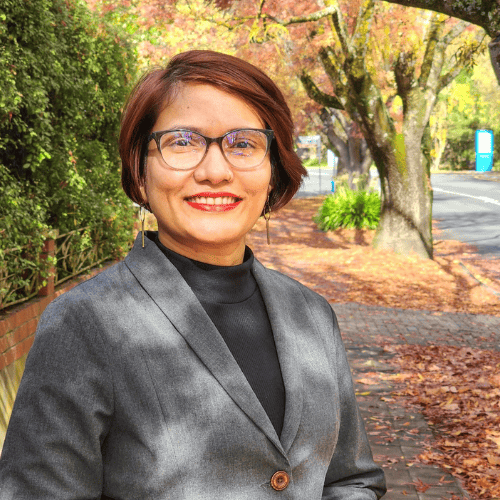
DTP alumna Nayela Akter is a project officer at the Asia Pacific Forum of National Human Rights Institutions (APF). The APF promotes and supports the work of independent National Human Rights Institutes (NHRIs) in the Asia and Pacific region. Currently Nayela is managing APF’s EU funded Inter-Governmental Mechanism (IGM) project. This supports the NHRIs in South-East Asia and the Pacific region to increase engagement of the selected Asian and Pacific Inter-Governmental Mechanisms on human rights issues.
Nayela participated in a year-long, multi-module capacity building program in Bangladesh in 2015-2016. The program was one in a series organised by DTP/Migrant Forum in Asia (MFA) to respond to abuses of migrant workers rights in countries of origin and destination.
Nayela says that training was pivotal for her in shaping her foundational knowledge of migrant workers’ rights. In Nayela’s view, the DTP training was also significant in spearheading a national advocacy momentum for the Bangladeshi civil society actors “who came together by putting aside their differences.”
“It is like yesterday; I remember the DTP training vividly. The training was a continuous initiative with some effective results. DTP training brought all the migrant rights NGOs in Bangladesh together to formulate a coherent national advocacy agenda for migrant workers’ rights.”
Nayela says that one of the critical aspects of DTP’s training is the practical application of human rights in advocacy and campaigning, which widened horizons on advocacy.
“The training ended with an actionable item for us. In that training, we developed our advocacy plan. And based on the advocacy plan, every group had to pick up what advocacy agenda they wanted to work on. For example, some participants chose to work on diplomatic missions; some chose to target the Bangladesh Association of International Recruiting Agencies (BAIRA) for advocacy, whereas others were working on the UN Convention on the Rights of Migrant Workers and their Families (CMW) which Bangladesh ratified in 2011 because of advocacy efforts.”
Nayela says that one of the memorable moments for her was when she applied knowledge gained through DTP training to coordinate and co-draft a shadow report to the UN Committee on the Rights of Migrant Workers, on behalf of Bangladeshi civil society actors. This shadow report raised issues and made recommendations as part of the UN’s scrutiny of the Bangladesh government’s record in implementing the CMW.
Nayela says that advocacy was a huge success.
“We went to Geneva, we presented our report, and after the UN Committee gave the recommendations to the Bangladesh government, we saw many recommendations reflected our suggestions. So advocacy works.”
A significant factor behind Nayela’s interest in human rights is her curiosity to understand peoples’ perspectives on rights. That curiosity began when she faced discrimination and bullying in school. At university, her interest and research in understanding the identity crisis of the Bihari refugees in Bangladesh, after the war of Independence that gave birth Bangladesh raised the ire of the mainstream Bengali society. As a female, in a patriarchal Bangladesh, she faced much discrimination too. Those experiences shaped her interest in working for Nari Progati Shangha, a national women’s activist organisation, and later in the Swiss organisation HELVETAS, where Nayela worked as a Gender and Social Inclusion focal person and worked in the area of women’s empowerment, migration, poverty, refugee, climate change, environment and disaster risk reduction for over eight years before migrating to Australia.
Nayela remembers a video shown in the DTP training called My Migrant Soul depicting the plight and struggles of Bangladeshi migrants and their families. “When the video was played, we all were weeping and we knew why we should work for the migrant workers.”
Nayela says that DTP training has helped her to learn how to do advocacy systematically, diplomatically in a different way, as well as what works in advocacy and what doesn’t.
“Through the training, I realized that activism does not mean participating in street processions all the time, but we can engage in activism and advocate our issues in many other ways. We can talk about human rights in forms that can make a real difference.”
DTP acknowledges the traditional custodians of the land on which we work, the Bedegal people of the Eora Nation. We recognise their lands were never ceded, and we acknowledge their struggles for recognition and rights and pay our respects to the Elders – past, present – and the youth who are working towards a brighter tomorrow. This continent always was and always will be Aboriginal land.
Aboriginal and Torres Strait Islander peoples should be aware that this website contains images or names of people who have passed away.
DTP acknowledges the traditional custodians of the land on which we work, the Bedegal people of the Eora Nation. We recognise their lands were never ceded, and we acknowledge their struggles for recognition and rights and pay our respects to the Elders – past, present – and the youth who are working towards a brighter tomorrow. This continent always was and always will be Aboriginal land.
Aboriginal and Torres Strait Islander peoples should be aware that this website contains images or names of people who have passed away.
Privacy Policy | Terms of Use | Disclaimer | Policies
© 2022 Diplomacy Training Program | ABN 31 003 925 148 | Web Design by Studio Clvr